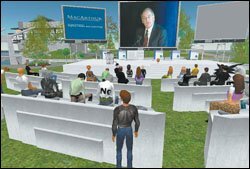• Blueprint Research and Design, San Francisco
Personalized digital characters known as avatars, each representing a user of the Web site Second Life, watch MacArthur Foundation President Jonathan Fanton speak during an Oct. 19 event in New York City to announce the philanthropy’s digital-learning initiative.
—Courtesy of the MacArthur Foundation

$80,000 to conduct a project for field building, planning, and analysis of trends in innovation, expertise, and distribution in digital media and learning; $450,000 to write reports and case studies about the use of digital media and the building of a new field.
• Digital Innovations Group (for Games for Change), Richmond, Va.
$250,000 to help build the field of digital learning through a Web site and social-networking tools, and a series of meetings.
• Exploratorium, San Francisco
$220,000 to produce background papers on the field of digital learning, including a literature review, a white paper on design research, and white papers on the future of education and technology.
• Global Kids, New York City
$900,000 to conduct youth-related activities that support the MacArthur Series on Digital Media and Learning; $170,000 to build the field of digital learning by engaging young people through written and online discussions of their use of digital media.
• Harvard University, Harvard Graduate School of Education, Cambridge, Mass.
$900,000 to conduct research on and prepare curricular modules related to young people’s ethical use of digital media.
• Illinois Institute of Technology, Institute of Design, Chicago
$250,000 to investigate the design of libraries and schools of the future.
• Indiana University, Department of Telecommunications, Bloomington, Ind.
$240,000 to create new approaches to social science research through use of virtual worlds.
• Massachusetts Institute of Technology, Comparative Media Studies Program, Cambridge, Mass.
$500,000 to develop a new framework and models for media literacy; $1.8 million to craft and test a comprehensive media-literacy curriculum and communications strategy for national distribution of new products.
• Mills College, School of Education, Oakland, Calif.
$450,000 to conduct a longitudinal study of the effect of digital media on young people’s civic engagement.
• Monterey Institute for Technology and Education, Pacific Grove, Calif.
$575,000 to produce the MacArthur Series on Digital Media and Learning.
• New Media Consortium, Austin, Texas
Return to the main story,
Funder Seeding Work in the Emerging Field of ‘Digital Learning’
$17,500 to produce a literature review, monograph, and communications activities related to visual and digital literacy in education; $575,000 to produce the MacArthur Series on Digital Media and Learning.
• Northwestern University, Institute for Policy Research, Evanston, Ill.
$309,000 to conduct a quantitative study of young people’s use of the Internet and the effects of an intervention to improve their use, skills, and participation.
• Stanford University, School of Education, Stanford, Calif.
$750,000 to document the design and implementation of an after-school media-literacy program in Chicago and in comparison cases.
• University of California, Berkeley, School of Information Management and Systems, Berkeley, Calif.
$145,420 to prepare a literature review and plan for a multisite ethnographic study of how and to what effect young people use digital media; $1.9 million to conduct a multi-site ethnographic study of how and to what effect young people use digital media.
• University of Chicago, Center for Urban School Improvement, Chicago
$1.6 million to continue to devise media-literacy after-school programs in Chicago.
• University of Southern California, Annenberg Center for Communication, Los Angeles
$80,580 to prepare a plan for a multisite ethnographic study of how and to what effect young people use digital media; $1.3 million to conduct a study on that topic.
• University of Wisconsin-Madison, ADL Co-Lab, Madison, Wis.
$1.2 million to design and develop innovative game modules, curriculum, and tools for media literacy; $1.8 million to devise and test a comprehensive media-literacy curriculum, new approaches to assessment, and communications strategy for national distribution of new products.
